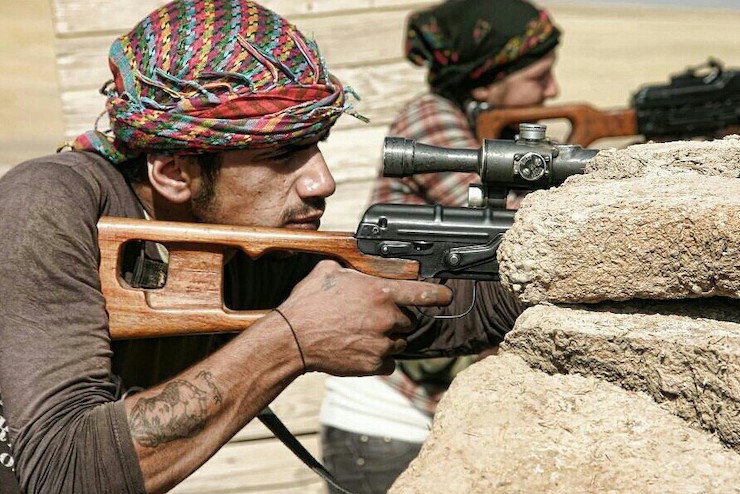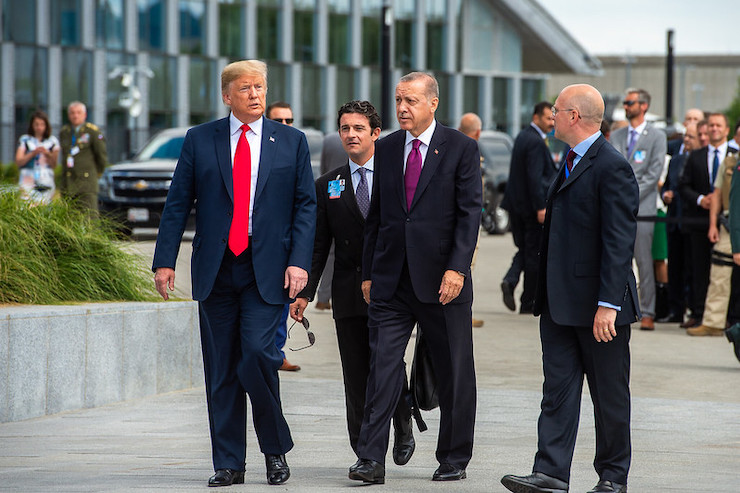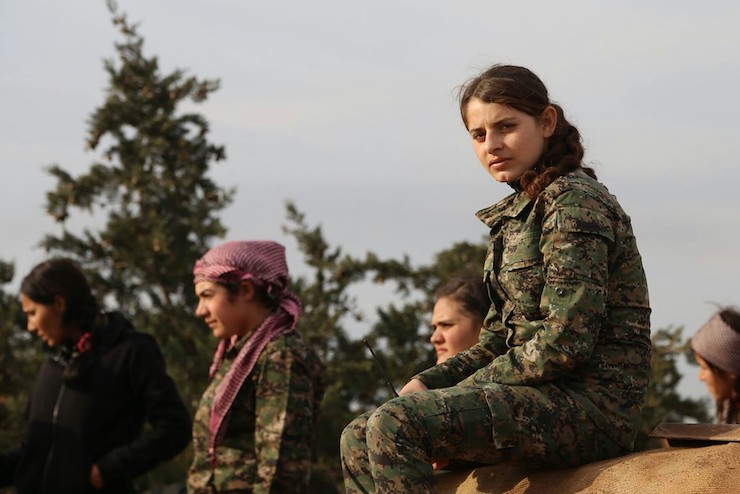Donald Trump’s apparent capitulation to Turkish President Recep Tayyip Erdogan on the fate of Syria’s Kurds risks paving the way for ISIS to renew its strength in the region, while adding to the growing murkiness of the Syrian conflict’s endgame.
By Kareem Shaheen

Even by Syria’s standards, the chaos of the last few days has been dizzying.
On Sunday evening, following a call between Donald Trump and Turkish President Recep Tayyip Erdogan, the White House issued a statement announcing that the United States would not stand in the way of an impending military operation by Ankara in northeastern Syria. The target of the incursion is Syria’s Kurdish militias, who were allied with the U.S. and led the ground campaign against ISIS. American troops in the area would withdraw from forward positions.
The American decision was condemned as a betrayal of Washington’s Kurdish allies, who also happen to be the Syrian wing of a separatist terror group that fought the Turkish state for decades. Ankara watched with increasing fury as the militias expanded their zone of control near the Turkish border with U.S. backing, and eventually launched military incursions to curb that expansion.
Trump faced mounting criticism for capitulating to Erdogan’s demands, including from people like Liz Cheney and Republican Senator Lindsey Graham, who are usually his most loyal allies. Trump responded to the onslaught of criticism with an increasingly unhinged series of tweets in which he seemed to be having a public argument with his alter ego. He threatened to destroy Turkey’s economy, then pointed out that it is an important trading partner and a member of NATO — as well as a strategic partner of the United States.
On Wednesday, Ankara announced it was going ahead with the operation, which it named Peace Spring, the latest in a series of Orwellian names for regional military operations. This bewildering series of events, which has precipitated another major military confrontation between the Kurds and Turkey, was inevitable.

Let us first survey the state of play in the Syrian conflict. After more than eight years of conflict, half a million dead and with half the country’s population displaced, the regime of Bashar al-Assad has won the war, thanks to the unwavering support of Moscow and Tehran. Government forces, backed by the Russian air force and pro-Iranian militias, have clawed back most of the country from rebel forces.
Only three areas remain outside of state control. The first is the province of Idlib, which is home to most of the displaced opposition activists and rebels who remained inside the country along with three million civilians, and is controlled militarily by the extremist group Hay’at Tahrir al-Sham, the latest iteration of the former al-Qaeda affiliate in the country.
The second is a region along the northern border with Turkey, which is held by the so-called rebel national army, an alliance of opposition brigades whose training and salaries are provided by Turkey, and which has won campaigns against both Kurdish militias and ISIS. This army will spearhead the new campaign.
The third area is controlled by the Syrian Democratic Forces (SDF), the U.S.’s partner in the campaign against ISIS. The grouping includes both Kurdish and Arab fighters, but the former are by far the most influential faction. It includes parts of eastern and northeastern Syria, with the latter region facing an imminent assault. The SDF patrols the areas that have been liberated from ISIS, such as Raqqa city, the former capital of the ISIS caliphate, and administers camps like Al-Hol, where many survivors from its last days still dwell.
Turkey, the second-largest army in NATO, considers the SDF to be a terrorist group. The Kurdish militia that forms the backbone of the SDF, known as the People’s Protection Units (YPG), is an offshoot of the separatist militia that fought against the Turkish state for decades. Kurdish aspirations for an autonomous region spanning large swathes of northern Syria, enabled by American air cover, was an intolerable provocation for Ankara. Still, Turkey acquiesced for years to Washington’s marriage of convenience with the Kurdish militias.
Turkey argued that the Arab rebel groups that were fighting the Assad regime were best suited to fight ISIS, which had emerged as the narrowly-focused obsession of the Obama administration. Because it prioritized the defeat of ISIS, the previous U.S. administration decided against taking punitive action when the Assad regime committed flagrant abuses of international law, as when it used chemical weapons against civilians. But rebel fighters saw ISIS as a symptom of the Assad regime’s extreme violence and insisted on fighting to overthrow both the Syrian dictator and the terror group. The U.S. rejected this tactic.
Kurdish allies of the U.S. have reacted publicly to Trump’s announcement by calling it a stab in the back. This betrayal was, however, only a matter of time. The inherent contradictions in the American pact with the SDF were always going to undermine it, simply because Turkey, the second-largest army in NATO, is a more important strategic partner, even if it has drifted toward the Russian orbit in recent years.
The immediate outcome of a Turkish incursion will likely be a major retreat by Kurdish forces, who are now without the protection of American air cover. This withdrawal will mean fewer counter-measures to limit the movement of ISIS fighters, who have gone into hiding in nearby areas. It also raises the risk that militant prisoners will escape amid the chaos. It leaves unanswered the question of who exactly will be responsible for hundreds of detained ISIS fighters who were captured and imprisoned by the SDF. The Kurds have for months been lobbying western states, with varying degrees of success, to repatriate those among the imprisoned fighters who are their citizens and try them in their own courts.

The withdrawal of U.S. military support could well be a decisive blow against Kurdish aspirations for self-governance in Syria. The SDF has largely maintained a détente with the Assad regime, and even assisted in its campaign to reclaim the city of Aleppo in 2016 by blocking supply routes for rebels besieged by government forces, an act that has caused deep-seated enmity within the Syrian rebel forces allied with Turkey. With the loss of territory, it will have little leverage in talks to reconcile with Assad, whose government was quick to declare its readiness in somewhat gloating terms to embrace the Kurds that fought alongside the United States.
This blow came on the heels of another major snub last month. A UN-brokered initiative to form a constitutional committee to draft Syria’s post-war charter conspicuously did not include major figures affiliated with the SDF, keeping the most powerful Kurdish faction on the sidelines as the government, civil society and opposition debate the shape and identity of Syrian society for years to come. The American abandonment will make the isolation even more pronounced.
For Turkey, the elimination of a Kurdish-controlled region on the border is just one of the reasons the campaign is a priority. Another is its desire to establish a so-called safe haven in order to repatriate many of the four million Syrian refugees in Turkey.
Erdogan’s government has for years sheltered Syrians fleeing the war. But the issue has emerged as a lightning rod for opponents who want nothing to do with their Arab neighbors and their wars, and for government supporters who scapegoat Syrians over Turkey’s economic woes. Erdogan’s party was punished in the recent mayoral election in Istanbul, a campaign followed by a crackdown that led to the deportation of an unknown number of Syrians to war-engulfed Idlib.
Tens of thousands of Syrians, per the Turkish government, have returned to their country voluntarily, to areas administered by its proxies inside Syria. The promise of another safe zone might lure thousands more. But any large-scale, forced repatriation of Syrians would be against international law, and would reengineer the fabric of the society in that region.
Finally, the campaign would leave the rebel national army with a larger swathe of territory under its control. A Turkish proxy, the rebel coalition has its own aspirations in the months to come, and their prime directive officially remains the overthrow of Bashar al-Assad. Though leashed by Ankara, victory in the campaign against the SDF could provide some much-needed leverage for the opposition in negotiations over a post-war settlement, as the endgame of the Syrian conflict grows even murkier.
Kareem Shaheen is the former Guardian correspondent for Turkey and the Middle East.
